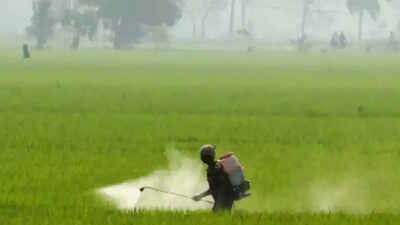- News
- City News
- noida News
- No receipt? Noida plans crackdown on pesticide dealers
No receipt? Noida plans crackdown on pesticide dealers

Representative image
NOIDA: The district administration is planning a crackdown on pesticide dealers after some farmers complained about dealers not giving cash receipts.
District plant protection officer Pradeep Yadav said, “These stores should have a stock register of pesticides sold to farmers. In cases of any damage to crops or pesticides not working, the cash receipts come handy in tracing their sources. Maintaining stock registers also ensures that none of the prohibited pesticides gets sold.”
The unsafe and indiscriminate use of pesticides leaves pesticide residues in food, which adversely impacts the health of humans and animals.
Officials said the average consumption of pesticides in the country is 0.38 kg per hectare, while the world average is 0.5 kg per hectare. Recently, Tricyclazole over the permissible limit of 0.01 parts per million was found in Basmati rice exported to the European Union.
Tricyclazole controls cholera, but using it after the grain has formed takes the maximum residue limit in rice above permissible limits, an official advisory released by the district plant protection officer claimed. Officials said that the Indian government has not prohibited Tricyclazole and Buprofezin use, but farmers are receiving education on avoiding the use of the two pesticides, considering the harmful health effects.
“Pesticides are commonly used in edible crops to improve crop yields by controlling weeds, insects, and other threats. However, synthetic and organic biopesticides can negatively effect health and environment. For instance, chronic exposure to pesticides increases the risk of Parkinson’s disease, Alzheimer’s disease, and certain cancers, namely breast, ovary, lung, and prostate. Studies suggest that pesticide use may have several negative effects on children too. Accidental exposure to high levels of pesticides in children are associated with cancer, attention deficit hyperactivity disorder, and autism,” Dr Pankaj Choudhary, senior consultant, internal medicine, Max Super Speciality Hospital, Vaishali, said.
District plant protection officer Pradeep Yadav said, “These stores should have a stock register of pesticides sold to farmers. In cases of any damage to crops or pesticides not working, the cash receipts come handy in tracing their sources. Maintaining stock registers also ensures that none of the prohibited pesticides gets sold.”
The unsafe and indiscriminate use of pesticides leaves pesticide residues in food, which adversely impacts the health of humans and animals.
Officials said the average consumption of pesticides in the country is 0.38 kg per hectare, while the world average is 0.5 kg per hectare. Recently, Tricyclazole over the permissible limit of 0.01 parts per million was found in Basmati rice exported to the European Union.
Tricyclazole controls cholera, but using it after the grain has formed takes the maximum residue limit in rice above permissible limits, an official advisory released by the district plant protection officer claimed. Officials said that the Indian government has not prohibited Tricyclazole and Buprofezin use, but farmers are receiving education on avoiding the use of the two pesticides, considering the harmful health effects.
“Pesticides are commonly used in edible crops to improve crop yields by controlling weeds, insects, and other threats. However, synthetic and organic biopesticides can negatively effect health and environment. For instance, chronic exposure to pesticides increases the risk of Parkinson’s disease, Alzheimer’s disease, and certain cancers, namely breast, ovary, lung, and prostate. Studies suggest that pesticide use may have several negative effects on children too. Accidental exposure to high levels of pesticides in children are associated with cancer, attention deficit hyperactivity disorder, and autism,” Dr Pankaj Choudhary, senior consultant, internal medicine, Max Super Speciality Hospital, Vaishali, said.
FOLLOW US ON SOCIAL MEDIA
FacebookTwitterInstagramKOO APPYOUTUBE
Looking for Something?

Start a Conversation
end of article









